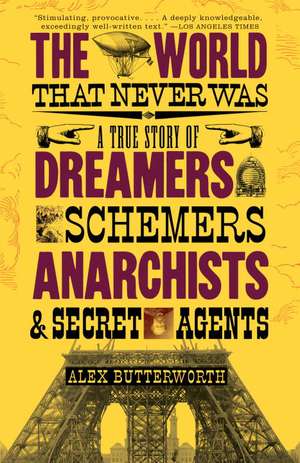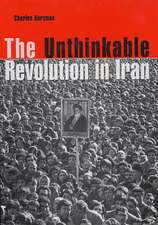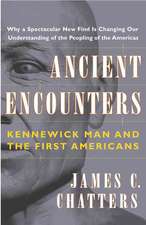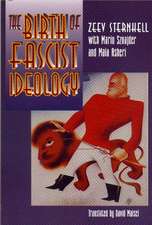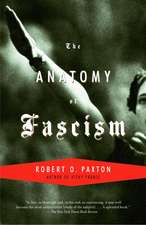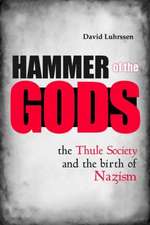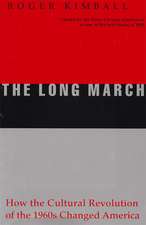The World That Never Was: A True Story of Dreamers, Schemers, Anarchists and Secret Agents
Autor Alex Butterworthen Limba Engleză Paperback – 31 iul 2011
In this riveting history of that tumultuous period, Alex Butterworth follows the rise of these revolutionaries from the failed Paris Commune of 1871 to the 1905 Russian Revolution and beyond. Through the interwoven stories of several key anarchists and the secret police who hunted them, Butterworth vividly describes how a movement born in idealism turned increasingly to desperate acts of terrorism and murder. Rich in anecdote and with a fascinating array of supporting characters, The World That Never Was offers a revelatory portrait of an era with uncanny echoes of our own.
| Toate formatele și edițiile | Preț | Express |
|---|---|---|
| Paperback (2) | 114.21 lei 3-5 săpt. | +15.86 lei 7-11 zile |
| Vintage Publishing – 3 mar 2011 | 114.21 lei 3-5 săpt. | +15.86 lei 7-11 zile |
| VINTAGE BOOKS – 31 iul 2011 | 124.06 lei 3-5 săpt. |
Preț: 124.06 lei
Nou
Puncte Express: 186
Preț estimativ în valută:
23.74€ • 25.78$ • 19.94£
23.74€ • 25.78$ • 19.94£
Carte disponibilă
Livrare economică 01-15 aprilie
Preluare comenzi: 021 569.72.76
Specificații
ISBN-13: 9780307386755
ISBN-10: 0307386759
Pagini: 518
Ilustrații: 8 PP B&W
Dimensiuni: 136 x 202 x 28 mm
Greutate: 0.5 kg
Editura: VINTAGE BOOKS
ISBN-10: 0307386759
Pagini: 518
Ilustrații: 8 PP B&W
Dimensiuni: 136 x 202 x 28 mm
Greutate: 0.5 kg
Editura: VINTAGE BOOKS
Notă biografică
Alex Butterworth is a historian and dramatist whose first book, Pompeii: The Living City, won the Longman-History Today New Generation Book of the Year Award in 2006. He lives in Oxford, England.
Extras
Prologue
This Thing of Darkness
Paris, 1908
In the eyes of the world, the group that assembled daily in Boris Savinkov’s spartan Paris apartment in October 1908 would have represented the most formidable concentration of terrorists history had yet seen. The sixty-six-year-old Peter Kropotkin, a descendant of the Rurik dynasty of early tsars, may have appeared unthreatening, with his twinkling eyes, bushy white beard, paunch and distinguished, bald dome of a head, but some suspected him of having incited the 1901 assassination of McKinley, the American president. With him sat his Russian contemporaries, the revolutionaries Vera Figner and German Lopatin, who had only recently emerged from the terrible Schlüsselburg fortress, against whose vast walls they had listened to the freezing waters of the River Neva and Lake Ladoga lap ceaselessly for twenty years. Locked in solitary confinement, in cells designed to prevent any communication, they were there as leaders of the organisation that had assassinated Tsar Alexander II in 1881. And among the younger generation, scattered around the room, there were others who could count grand dukes, government ministers and police chiefs among their many victims. But whatever the suspicions at the French Sûreté, Scotland Yard or the Fontanka headquarters of the Russian Okhrana, whose agents loitered in the street outside, their purpose on this occasion was not to conspire, but to uncover the conspiracies of others.
Kropotkin, Lopatin and Figner – an exalted trio in the revolutionary pantheon – had been summoned to form a Jury of Honour, for a trial convened by the central committee of the Socialist Revolutionary Party of Russia. Their task was to determine the truth or otherwise of an extraordinary accusation made by one of their number: that the movement’s most idolised hero, Evno Azef, was in fact in the pay of the Okhrana, and responsible for a shocking series of deceptions and betrayals.
Commissioned for the weight of authority and experience that they could bring to bear in a case of unprecedented sensitivity, it was hoped that their status would ensure that, whatever the verdict, it would be beyond challenge.
It was a necessary precaution, for in this looking-glass trial, staffed exclusively by notorious lawbreakers, one thing above all was topsyturvy. Vladimir Burtsev, the revolutionary movement’s self-appointed counter-intelligence expert, who had levelled the original accusation of treachery, had become the accused. Okhrana ruses to seed dissent in the revolutionary movement were all too common, and after his defamatory allegations concerning the legendary Azef, the Jury of Honour needed to settle the matter once and for all.
So it was that, for three weeks, the distinguished jurors sat behind a table and listened as the neat, intense figure of Vladimir Burtsev, with his light goatee beard and steel-rimmed spectacles, earnestly explained how the revolutionary they all knew as the ‘Frenchman’ or ‘Fat One’ at the same time figured on the Okhrana payroll as ‘Vinogradov’, ‘Kapustin’, ‘Philipovsky’ and ‘Raskin’. Their Azef had bound his comrades in a cult of self-sacrifice by his sheer charisma, relished the destruction of the tsar’s allies and fantasised about remote-control electrochemical bombs and flying machines that could deliver terror ever more effectively. The Okhrana’s Azef had set his comrades up for mass arrest by the political police in raids that stretched from the forests of Finland to the centre of Moscow, then celebrated at orgies laid on by his secret-police handler in a private room of the luxurious Malyi Iaroslavets restaurant. A St Petersburg apartment was, Burtsev alleged, reserved exclusively for the fortnightly meetings at which Raskin-Azef and the head of the Okhrana coordinated their priorities. This Azef thought nothing of murdering comrades, or betraying them for execution, to cover his tracks. And his heinous treachery was tinged with the macabre: once, on being shown the head of an unknown suicide bomber preserved in a jar of vodka by his police handler, he had appeared to relish identifying it as that of ‘Admiral’ Kudryavtsev, a rival from the Maximalist faction of terrorists.
As those in the courtroom listened to Burtsev’s allegations, an instinct for psychic self-protection closed their minds. To the veteran revolutionaries Azef was a potent avenger of past wrongs, while the younger generation had allowed themselves to become emotionally enslaved to their mentor’s mystique. For either group to entertain the possibility that Azef might be a traitor was to peer into an abyss. How, they demanded, could Burtsev possibly prove such an absurdity? That very day, Savinkov told the court, he was awaiting news of Tsar Nicholas’ assassination on board the new naval cruiser Rurik during its maiden voyage, according to a plan formulated by Azef. What comparable proof of his own commitment to the cause could Burtsev offer? Was the truth not, in fact, that it was Burtsev himself who had been turned by the Okhrana and assigned to destabilise their organisation? Why, others pressed, did Burtsev refuse to name his witnesses, if they actually existed, unless they were of such questionable reliability as to make protecting their anonymity a safer strategy for him to pursue? Vera Figner, whose long imprisonment had done nothing to soften her pitiless dark eyes, snarled at Burtsev that once his infamy was confirmed he would have no choice but to make good on his promise to blow out his own brains.
Under such pressure, Burtsev played his trump card. Shortly before the Jury of Honour had convened, he confided, feeling their rapt attention, he had tracked down the ex-chief of the Russian political police, Alexei Lopukhin, to Cologne. Discreetly, he had followed him on to a train, hesitating until they were under steam before he entered his compartment. Lopukhin might have been expected to flinch at the appearance of a possible assassin, and curse the loss of the protection he had enjoyed when in police service: the armed guard of crack agents and the locked carriages and shuttered windows. Instead, encountering one of his enemies on neutral territory, he treated him like an honoured foe. At Burtsev’s suggestion, the pair settled down to a guessing game: he would hazard a description of the police department’s foremost secret agent, and Lopukhin would confirm only whether his surmise was correct...
As Burtsev concluded his compelling tale, German Lopatin groaned. ‘What’s the use of talking?’ he said. ‘It’s all clear now.’ Azef had refused to attend the trial, arguing that a sense of affront prevented him from being present in the courtroom to clear his name. His punishment was therefore decided in absentia. A villa would be rented with a tunnel that led to a cave just across the Italian border where the traitor could be hanged without diplomatic repercussions. Realising that the man he had trusted above all others had played him for a fool, Savinkov bayed loudest for blood.
*
Until Burtsev had delivered his bombshell, only the elderly Kropotkin had been resolute in his support of his thesis. There was a personal sympathy, certainly, for Burtsev who, like his own younger self, had managed to escape from the tsarist police in the most dramatic fashion. And Kropotkin may have remembered too how, over thirty years before, he had spent many hours trying to convince a sceptical German Lopatin, now his co-juror, of his own credibility: that his aristocratic background should not stand in the way of his joining the revolutionaries. Most of all, though, he possessed a hard-earned understanding of the bottomless depths that the chiefs of the Russian political police would plumb in their scheming. In the course of his career as one of anarchism’s greatest theorists and leading activists, he had repeatedly seen idealistic men and women across the world fall prey to the wiles of agents provocateurs. Kropotkin had come to believe where persistent charges of spying and provocation were made by a number of individuals over a period of time, that the smoke nearly always signalled fire.
Stepping out into the rue La Fontaine, after the agreement of Azef ’s sentence, careless of the watchful eyes that swivelled towards him over upturned collars and twitching newspapers, Kropotkin would have felt a mixture of relief and dismay: that the traitor had been unmasked, but that the struggle to which he had devoted his life had engendered such a creature. The exposure of Azef was surely to be celebrated for the light it shed into the diabolical realm of shadows where he had dwelt: a world in which the boundaries of reality and invention were blurred. Kropotkin had many regrets about anarchism’s long drift into the use of terror tactics, and must have been tempted to blame the intrigues and provocations of the secret police, and imagine the cancer excised. And yet, in many ways, Evno Azef embodied the central paradox of the political philosophy that Kropotkin had done so much to develop and promulgate. Simple in his brute appetites, yet dizzyingly adept as a conspirator, Azef ’s unusual blend of attributes shaped him into a phenomenon of a sort that no one involved in the revolutionary struggle had adequately foreseen.
Anarchism’s ultimate aim was to usher in a society of perfect beings; a heaven on earth in which harmonious coexistence was achieved without coercion or the impositions of distant authority, but rather arose out of each individual’s enlightened recognition of their mutual respect and dependency. Such a world, Kropotkin believed, would flourish naturally once the age-old cages of commerce, hierarchy and oppression that stunted and distorted human nature were torn down. Until then an anarchist programme of education could usefully preserve a generation from such taint, and prepare it to claim mankind’s birthright in full. There were those, however, who acted on the impulse to hasten the advent of that paradise, or else out of vengeance or frustration, taking only their own vaunted conscience as their guide.
Though consistent with anarchism’s idealistic tenets, such a creed was a recipe for disaster in a flawed society whose injustices already drove men to insanity and crime. For when the movement’s ideological leaders refused on principle to disown murder, violent theft or even paid collaboration with the police, if it helped feed a starving mouth or might advance the cause, the scope for the malicious manipulation of susceptible minds was boundless.
The world was far from what Kropotkin had dreamed it might become, but was there no hope for the future? Adjoining Savinkov’s apartment block in rue La Fontaine stood the architect Guimard’s newly constructed art nouveau masterpiece, Castel Béranger. In the sinuous, organic forms of its gated entrance – in the mysterious leaves and tendrils of its decorative wrought iron, that curled up from the ground like smoke, then whiplashed back – ideas central to his political creed had been distilled into a compelling visual form: individualism challenged uniformity, while progress vanquished convention. And yet the Paris in which he had spent the last three weeks – a belle époque city of exclusive pleasures and spasmodic street violence – fell far short of the aspirations expressed in its architecture.
The filigree ironwork that vaulted the new Grand Palais, the crowds that issued periodically from the stations of the recently tunnelled Métro, and the soaring pylon of the Eiffel Tower eloquently expressed the great era of change that had passed since Kropotkin’s first visit to the city three decades before. But there was scant evidence that the human ingenuity expended on the technological advances of the age had been matched by developments in the political and social spheres. While the years had mellowed the elegant masonry in which Baron Haussmann, Emperor Napoleon III’s prefect of the Seine, had rebuilt Paris in the 1860s, the crushing bourgeois values of self-interest and conformity celebrated in his mass-produced blocks still held sway. Fear of a rising Germany had ten years earlier driven the French Republic into a shameful alliance with despotic Russia, and more recently it had become a full and eager signatory to the draconian St Petersburg protocol on international antianarchist police cooperation. Worst of all, it was old radical associates of Kropotkin’s like Georges Clemenceau, prime minister for the past two years, who bore much of the responsibility for betraying the principles on which the Third Republic had been founded.
Kropotkin nevertheless retained an unshakeable faith that the rebirth of society was imminent. Perhaps in tacit acknowledgement of his part in allowing the creation of monsters like Azef, he would devote his last years to the culminating project of his life: a work of moral philosophy for the dawning age of social revolution. That future, Kropotkin was quite certain, would be born in war and strife. A renewal of hostilities between Germany and France, which had threatened repeatedly during the three decades and more since Bismarck’s armies had besieged Paris, would at long last precipitate a fight for justice against the forces of reaction. It would come soon – next week, perhaps, or the week after – and its challenges could only be met if the lessons of past failures had been fully addressed. Those who remained of his generation, who had lived through those failures, must point the way.
He would have thought of them often during his time in Paris: the men and women of the Commune, who for eight extraordinary weeks of insurrection during the spring of 1871 had risen up to create their own autonomous government in the city. Some of them, now dead of old age, had become Kropotkin’s closest friends: the geographer Elisée Reclus, who had been captured during the Communards’ first, disastrous sortie against the Versaillais forces intent on crushing their social experiment; Louise Michel, the Red Virgin, who had still been there at the doomed defence of the Issy fortress, and throughout the Communards’ tragic, fighting retreat across the city.
It had been stories of the Paris Commune that had helped inspire Kropotkin to leave behind his life as a leading light of Russia’s scientific Establishment and devote himself to the revolutionary cause. Ten years after first hearing the wistful recollections of Communard exiles, drinking in a Swiss tavern in the immediate aftermath of defeat, he had written them down. ‘I will never forget’, one had said, ‘those delightful moments of deliverance. How I came down from my supper chamber in the Latin Quarter to join that immense open-air club which filled the boulevards from one end of Paris to the other. Everyone talked about public affairs; all mere personal preoccupations were forgotten; no more thought of buying or selling; all felt ready to advance towards the future.’ Both Reclus and Michel had died in 1905, the year when revolution had finally touched Russia, only to end before it could begin, but that optimism remained alive.
In his obituary of Reclus, Kropotkin had paid tribute to the role played by his fellow geographer during the 1870 Siege of Paris, when he had served as an assistant to the great balloonist Nadar, whose daring aeronauts ferried messages out of the city and over the Prussian lines. Had his cerebral, reticent old friend really been one of those fearless men who floated aloft in the balloons, braving the Prussian sharpshooters? Had Reclus looked down across Paris from a vantage point higher than that from the tower, that was then not yet even a glimmer in Eiffel’s eye, and dreamed of what the world might be? It mattered so much from where you saw things, and what you wanted to see. For fiction could so easily be confused with truth, and truth relegated to the realm of fiction.
From the Hardcover edition.
Recenzii
“Stimulating, provocative. . . . A deeply knowledgeable, exceedingly well-written text.”
—Los Angeles Times
“Exhilarating. . . . A headlong gallop through the history of anarchism. . . . Almost any paragraph packs more action than an entire Dan Brown novel. . . . The globe-girdling energy of these itinerant schemers is dizzying.”
—Financial Times
“Stocked with vivid characters. . . . Butterworth shows how political violence committed by disorganized cells of anarchists, socialists, and nihilists fuelled fears of an international conspiracy and justified reactionary crackdowns.”
—The New Yorker
“Thorough. . . . Compelling. . . . It leads one to ask if anarchism might again (or, perhaps, still) be lurking at the fringes of society.”
—The Washington Post
“A timely tale of a vicious cycle in which violence begets violence—and innocence, idealism and justice are the victims . . . [Butterworth] brings to life the social and intellectual ferment of the late 19th century.”
—Kansas City Star
“Painstakingly researched. . . . Butterworth charts this tangled terrain with authority and rigor. . . . [His] tale crosses paths with most of the era’s most important figures, from monarchs to literary giants, while presenting some of the fascinating characters in the anarchist movement. Many of the latter couldn’t have been dreamed up by the most inventive novelist.”
—Milwaukee Journal Sentinel
“Fascinating. . . . A historical pot-boiler. . . . Butterworth charts the odyssey of these European revolutionaries as they fought to build a new society, and the furious maneuvers by security services to thwart them.”
—The Boston Globe
“In this rich and passionate account of the world’s first international terrorist campaign . . . the disquieting echoes of our times are impossible to ignore. . . . Underpinned by impressive research and a genuine argument . . . this is a thrilling and important book—not least for its unmasking of the forces of reaction.”
—The Sunday Times (London)
“Chillingly familiar. . . . Butterworth strikes a rare balance; he doesn’t flinch from moral judgment, but he’s not about to succumb to the propagandizing instinct himself by glossing over the radicals’ many flaws and impracticalities. . . . The World That Never Was has much of value to impart, from the understanding that today’s radicals may be tomorrow’s sensible visionaries to the unanticipated perils of both terrorism and counterterrorism.”
—Salon
“Exceptionally astute. . . . One of the most absorbing depictions of the dark underside of radical politics in many years. . . . A riveting account, teeming with intrigue and adventure and packed with the most astonishing characters.”
—New Statesman
“Conveys the labyrinthine coils of conspirators and spies with graphic panache. . . . Butterworth has created an impressive work which will captivate those unfamiliar with anarchist history and teach even specialists much that they did not know before.”
—The Independent (London)
“Butterworth writes lucidly, in fine detail, seeking answers that must sometimes prove elusive. . . . It’s a formidable task, formidably (and entertainingly) accomplished.”
—The Observer (London)
“Ingenious. . . . Butterworth, in this wide-ranging account of nineteenth century anarchist activity, does justice to both sides of the picture—the glowing ideal, its shady enactment.”
—The Sunday Telegraph (London)
—Los Angeles Times
“Exhilarating. . . . A headlong gallop through the history of anarchism. . . . Almost any paragraph packs more action than an entire Dan Brown novel. . . . The globe-girdling energy of these itinerant schemers is dizzying.”
—Financial Times
“Stocked with vivid characters. . . . Butterworth shows how political violence committed by disorganized cells of anarchists, socialists, and nihilists fuelled fears of an international conspiracy and justified reactionary crackdowns.”
—The New Yorker
“Thorough. . . . Compelling. . . . It leads one to ask if anarchism might again (or, perhaps, still) be lurking at the fringes of society.”
—The Washington Post
“A timely tale of a vicious cycle in which violence begets violence—and innocence, idealism and justice are the victims . . . [Butterworth] brings to life the social and intellectual ferment of the late 19th century.”
—Kansas City Star
“Painstakingly researched. . . . Butterworth charts this tangled terrain with authority and rigor. . . . [His] tale crosses paths with most of the era’s most important figures, from monarchs to literary giants, while presenting some of the fascinating characters in the anarchist movement. Many of the latter couldn’t have been dreamed up by the most inventive novelist.”
—Milwaukee Journal Sentinel
“Fascinating. . . . A historical pot-boiler. . . . Butterworth charts the odyssey of these European revolutionaries as they fought to build a new society, and the furious maneuvers by security services to thwart them.”
—The Boston Globe
“In this rich and passionate account of the world’s first international terrorist campaign . . . the disquieting echoes of our times are impossible to ignore. . . . Underpinned by impressive research and a genuine argument . . . this is a thrilling and important book—not least for its unmasking of the forces of reaction.”
—The Sunday Times (London)
“Chillingly familiar. . . . Butterworth strikes a rare balance; he doesn’t flinch from moral judgment, but he’s not about to succumb to the propagandizing instinct himself by glossing over the radicals’ many flaws and impracticalities. . . . The World That Never Was has much of value to impart, from the understanding that today’s radicals may be tomorrow’s sensible visionaries to the unanticipated perils of both terrorism and counterterrorism.”
—Salon
“Exceptionally astute. . . . One of the most absorbing depictions of the dark underside of radical politics in many years. . . . A riveting account, teeming with intrigue and adventure and packed with the most astonishing characters.”
—New Statesman
“Conveys the labyrinthine coils of conspirators and spies with graphic panache. . . . Butterworth has created an impressive work which will captivate those unfamiliar with anarchist history and teach even specialists much that they did not know before.”
—The Independent (London)
“Butterworth writes lucidly, in fine detail, seeking answers that must sometimes prove elusive. . . . It’s a formidable task, formidably (and entertainingly) accomplished.”
—The Observer (London)
“Ingenious. . . . Butterworth, in this wide-ranging account of nineteenth century anarchist activity, does justice to both sides of the picture—the glowing ideal, its shady enactment.”
—The Sunday Telegraph (London)
Descriere
Descriere de la o altă ediție sau format:
The last years of the nineteenth century saw the birth of a new phenomenon: international terrorism. Alex Butterworth interweaves group biography, cultural history and meticulous detective work to create a revelatory account of the age.
The last years of the nineteenth century saw the birth of a new phenomenon: international terrorism. Alex Butterworth interweaves group biography, cultural history and meticulous detective work to create a revelatory account of the age.
